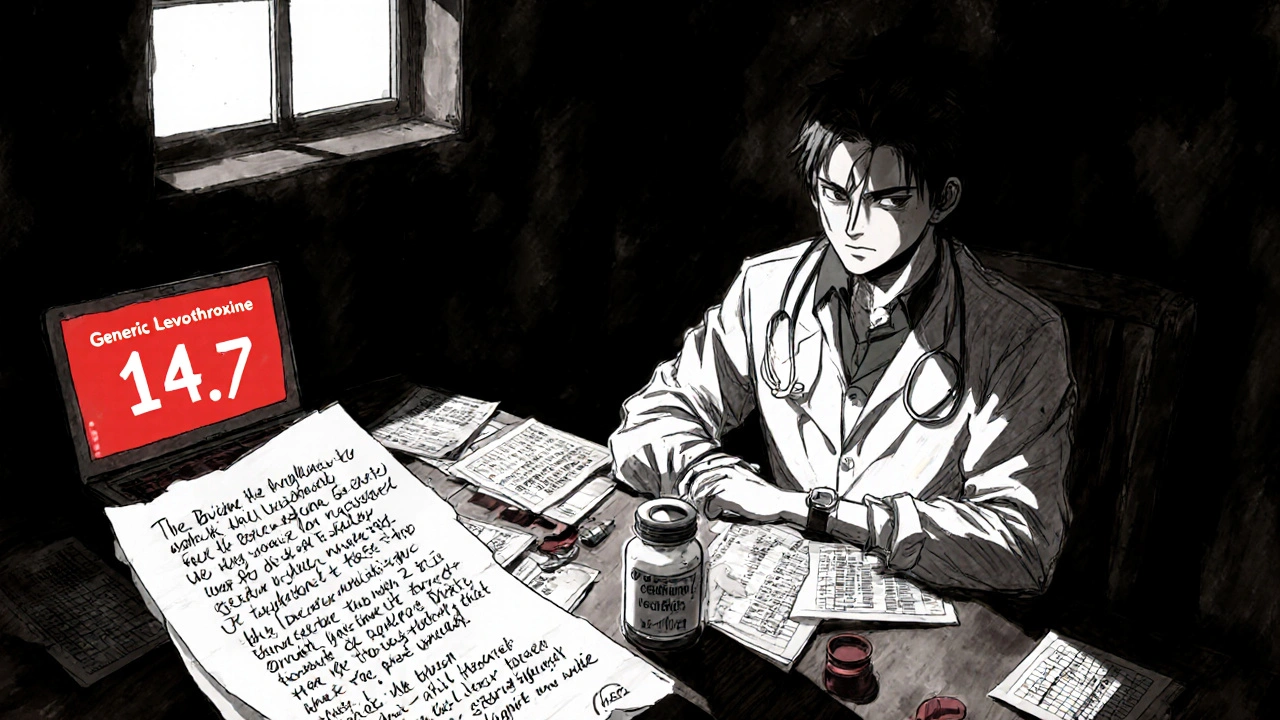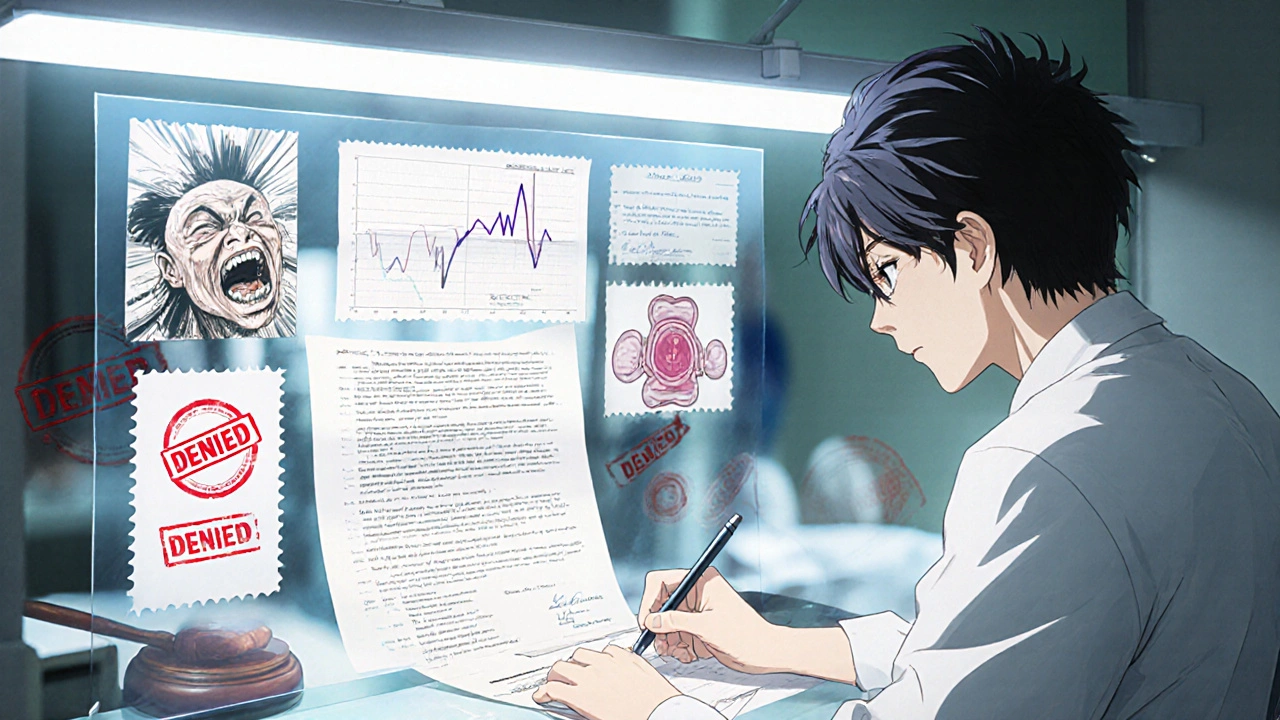
When Your Generic Medication Doesn’t Work, You Have Rights
It happens more often than you think. Your doctor prescribes a brand-name drug because it’s the only thing that keeps your condition under control. Then your insurance denies it - not because it’s too expensive, but because a generic version exists. You fill the prescription, take it as directed, and nothing changes. Or worse - you feel worse. Your seizures return. Your thyroid levels spike. Your pain flares up. You call your pharmacy. You call your doctor. You call your insurer. And they say: "The generic is just as good. It’s FDA-approved. No exceptions." That’s not true. And you don’t have to accept it.
Why Generics Can Fail - Even When They’re "Bioequivalent"
The FDA says generics must deliver 80% to 125% of the active ingredient compared to the brand-name drug. That sounds precise. But for some people, that 45% window is wide enough to cause real harm.
Take levothyroxine, the drug used to treat hypothyroidism. A patient might do fine on Synthroid for years. Switch to a generic, and suddenly their TSH jumps from 2.1 to 14.7. That’s not a lab error. That’s a therapeutic failure. Why? Because even tiny differences in inactive ingredients - like fillers, dyes, or binders - can affect how the drug is absorbed. For people with Crohn’s disease, celiac, or other gut conditions, this matters more than you’d think.
The same goes for antiseizure drugs like levetiracetam (Keppra) or blood thinners like warfarin. These are narrow-therapeutic-index drugs. That means there’s a razor-thin line between too little and too much. A 10% difference in absorption can mean the difference between control and crisis.
According to the American Medical Association, 15-20% of patients experience therapeutic failure with generic substitutions in these high-risk categories. The FDA doesn’t test every batch of every generic for every patient. They test for average performance. You’re not an average.
What to Do When Your Insurance Says "No"
Your first step? Don’t panic. Don’t stop taking your meds. And don’t assume the denial is final.
Insurance denials for brand-name drugs because "a generic is available" are common - but they’re not automatic. You have a legal right to appeal. The Affordable Care Act gave you that right. And every major insurer - whether it’s Blue Cross, UnitedHealthcare, Medicare Part D, or your employer’s plan - must follow a formal appeals process.
Here’s how it works:
- Get your Explanation of Benefits (EOB). This is the letter your insurer sends after denying coverage. Look for codes like DA2000 ("generic available") or DA1200 ("not on formulary").
- Call your doctor’s office. Ask them to write a letter of medical necessity. Don’t just say "the generic doesn’t work." Say: "Patient experienced breakthrough seizures after switching from brand-name Keppra to generic levetiracetam. TSH increased from 2.1 to 14.7 after switching from Synthroid to generic levothyroxine. Lab results attached."
- Attach your lab results. Blood tests showing subtherapeutic levels are gold. If your TSH, INR, or drug level dropped or spiked after switching, that’s your evidence.
- Submit your appeal within the deadline. For commercial insurance, you have 180 days. For Medicare Part D, you have 60 days. Miss it, and you lose your right to appeal.

The Magic Ingredient: Physician Documentation
Here’s the truth: 82% of appeals succeed when the doctor’s letter includes specific clinical data. Only 37% succeed when it just says "I think this is better." Your doctor doesn’t need to be a legal expert. They just need to write clearly. A strong letter includes:
- Exact drug names (brand and generic)
- Dates of switch and symptom onset
- Lab values before and after
- Previous attempts with other generics
- Relevant guidelines (like the 2019 Endocrine Society guidelines for thyroid meds)
- ICD-10 codes for your condition
One patient, u/ThyroidWarrior on Reddit, won their appeal after submitting lab results showing a 600% spike in TSH after switching generics. Their doctor’s letter cited the Endocrine Society’s warning about switching thyroid meds. Approval came in 11 days.
Another case: a patient with SCN1A mutation epilepsy. After generic levetiracetam caused severe neuropsychiatric side effects, their neurologist submitted functional MRI data showing abnormal brain activity. The insurer approved the brand-name Keppra. This isn’t rare. It’s documented.
Success Rates - And Why You Should Keep Trying
Don’t get discouraged if your first appeal gets denied. Most do. But here’s what the data shows:
- 42% of initial appeals are denied
- 67% of external reviews overturn denials when proper documentation is provided
- For antiseizure drugs, approval rates hit 78%
- For thyroid meds, appeals citing FDA-recognized labeling differences (like Synthroid’s specific indication) have an 89% success rate
Medicare Part D beneficiaries have a 58% success rate on the first appeal. Commercial plans? Only 39%. But if you go to external review - an independent third party - your odds jump to 67%.
States matter too. California, New York, and Texas have higher approval rates because they have stronger protections. If you’re in one of those states, use it.
What Insurers Don’t Tell You
Some insurers require you to try three or four generics before they’ll even consider your appeal. That’s not fair. And in 28 states, it’s illegal. You can’t be forced to try multiple generics if you’ve already documented failure.
They might also say: "There’s no proof the generic didn’t work." But that’s backwards. The burden isn’t on you to prove failure. It’s on them to prove the generic is appropriate. Your lab results, symptom logs, and doctor’s letter are proof enough.
And here’s a hidden trick: if you’re in a medical emergency - like a seizure, stroke risk, or thyroid storm - you can request an expedited review. Medicare must respond in 72 hours. Commercial insurers must respond in 72 hours if your condition is urgent.

Tools That Help - And Who to Call
You don’t have to do this alone.
- GoodRx Appeal Assistant: Generates a pre-filled appeal letter your doctor can sign in minutes. Used by over 147,000 people in 2023 with a 68% success rate.
- Patient Advocate Foundation: Free case management. Call 1-800-532-5274. They’ve helped over 12,000 patients appeal drug denials. Their 2023 report shows 92% satisfaction.
- Partnership for Prescription Assistance: Helps patients get brand-name drugs through appeals. Helped 28,000 people in 2023.
Some specialty pharmacies like OptumRx and Accredo now offer appeal support services. Their success rate? 73% - higher than self-managed appeals.
What’s Changing - And Why There’s Hope
The system isn’t perfect. But it’s getting better.
In 2024, CMS mandated that insurers process appeals for antiseizure drugs within 72 hours. That’s because too many people were having seizures while waiting.
The Inflation Reduction Act eliminated cost-sharing for successful appeals. If you win, you pay nothing for the brand-name drug.
19 states now have "right to try brand" laws. After two documented generic failures, insurers must approve the brand-name version.
The FDA is even considering new guidelines that acknowledge individual bioequivalence differences. That could change how generics are approved - long term.
But here’s the bottom line: You don’t need to wait for policy changes. You have the power now.
What to Do Right Now
- Check your last Explanation of Benefits. Did you get denied for a generic?
- Look at your recent lab results. Any big changes after switching meds?
- Call your doctor. Say: "I need to appeal my insurance denial. Can we schedule 20 minutes to document my case?"
- Use GoodRx’s free appeal tool to draft your letter.
- Submit your appeal before the deadline.
This isn’t about fighting the system. It’s about making sure the system works for you. You’re not asking for a luxury. You’re asking for a treatment that works. And that’s not just reasonable - it’s your right.

Mark Kahn
November 20, 2025 AT 09:02Leo Tamisch
November 21, 2025 AT 04:38Daisy L
November 22, 2025 AT 01:33Eliza Oakes
November 22, 2025 AT 22:56Shawn Sakura
November 24, 2025 AT 02:43Swati Jain
November 25, 2025 AT 18:36Florian Moser
November 25, 2025 AT 22:08jim cerqua
November 26, 2025 AT 23:03Cooper Long
November 28, 2025 AT 22:23Logan Romine
November 30, 2025 AT 08:53Franck Emma
November 30, 2025 AT 12:53